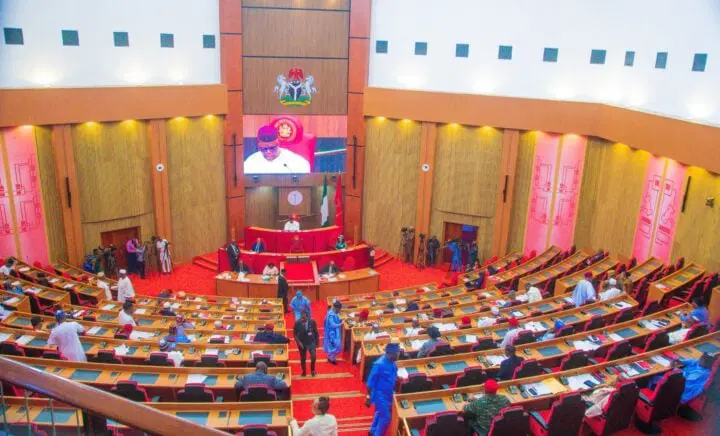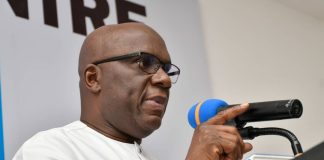🌿 Ruzu Non-Alcoholic Herbal Bitters
Ruzu Non-Alcoholic Herbal Bitters is a natural health supplement specially formulated to:
- ✅ Promote general wellness
- ✅ Detoxify the body
- ✅ Support the treatment of various ailments
Made from a powerful blend of 100% organic and medicinal herbs, Ruzu is completely alcohol-free, making it ideal for:
- 👪 All age groups
- 🌱 Health-conscious individuals
- 🌿 Anyone seeking non-alcoholic herbal remedies
Whether you're looking to boost your vitality, cleanse your system, or support healing the natural way, Ruzu Bitters offers a trusted herbal solution.
Nigerians have been reacting to the Senate’s ad hoc committee looking into crude oil theft in the Niger Delta’s recent discovery that approximately N300 billion in crude oil revenues were missing.
Massive disparities, lax supervision procedures, and systemic flaws that have allowed for the widespread diversion of Nigeria’s crude oil earnings were described in the committee’s interim report to the Senate.
According to the report, a forensic examination of domestic crude proceeds and tax oil proceeds records uncovered discrepancies, inconsistencies, and unexplained funds totaling around $22 billion from crude oil sales. Additionally, it discovered a $81 billion discrepancy between the Central Bank of Nigeria’s (CBN) records for 2016 and 2017 and the receipts reported by the Nigerian National Petroleum Company Limited (NPCL).
Additionally, the committee reported that its analysis of crude oil sales from 2015 to the present, bolstered by inquiries from foreign experts, estimated that more than $200 billion in revenues from crude oil sales were still unaccounted for worldwide.
After months of document examinations, written comments, and public hearings, the interim report identified flawed measuring systems, lax regulatory supervision, and inadequate agency coordination as the root causes of the issue.
Crude oil theft was shown to be greatly aided by the deployment of unreliable measuring devices, a lack of metrological control, poor interagency cooperation, and disorganized enforcement measures.
However, the research criticized the Petroleum Industry Act (PIA) 2021’s suspension of the Weights and Measures Department’s operations in the upstream sector, claiming the decision compromised precise measurement and accountability in crude oil operations.
It also mentioned that ongoing theft and sabotage in oil-producing regions were caused by the lack of a specific court to prosecute oil thieves and the failure to establish the Host Communities Development Trust Fund, or HCDTF, under the PIA.
The committee called for immediate local and international tracking, tracing, and recovery of stolen crude oil profits for the benefit of the nation, estimating that the unexplained proceeds from domestic crude sales amounted to approximately N300 billion.
It called on the Federal Government to either reinstate the Weights and Measures Department to its previous regulatory function or order the Nigerian Upstream Regulatory Commission, or NUPRC, to enforce international crude oil measurement standards at all production sites and export terminals.
In order to improve monitoring of oil installations and identify theft and leaks in real time, they also encouraged the government to give the security services access to contemporary surveillance technology and equipment, such as unmanned aerial vehicles.
It asked for the construction of a special court to swiftly try crude oil thieves and their accomplices, as well as the creation of a marine Trust Fund to fund the development and upkeep of marine infrastructure, training, and safety operations.
The committee also recommended that the HCDTF be implemented right away in order to lessen community sabotage and encourage participation in the management of oil resources.
Beyond monetary losses, however, the committee also voiced worry about the increasing number of badly decommissioned and abandoned oil wells in the Niger Delta, which it claimed were polluting communities and leaking gas and oil into the environment.
In order to decrease vandalism and enhance the supply of crude for local use, it was suggested that these wells be turned over to the NUPRC for use in modular refineries.
It did observe a slight improvement in production and security conditions, though, as crude oil output rose by 9.5 percent in 2023 from 490.95 million barrels in 2022 to 537.57 million barrels.
After Senator Ifeanyi Ubah, the Committee’s previous chairman, passed away on February 11, 2025, the Committee was reorganized and asked the Senate to give it the power to detect, trace, and reclaim proceeds of stolen crude oil worldwide.
It stated that recovering the money was essential to bolstering Nigeria’s budgetary position, preventing future theft, and restoring responsibility in the oil industry.
However, the Senate emphasized that recovering stolen money was not the committee’s responsibility, even as it praised the committee for a job well done. It instructed the committee to finish its inquiry and identify the oil thieves, after which the administration will get its suggestions for additional action.
However, there have been a variety of responses to the discoveries, including calls for serious measures to prevent such financial depravity in the future as well as outbursts of wrath, disillusionment, and silence.
Those who are upset and dissatisfied with the study claim that it only confirms what has long been known—namely, that the amount of corruption in the oil industry is abhorrent and pervasive.
Idowu Christopher, a prominent member of this organization and an analyst of the oil sector, claimed that although the government is aware of those responsible for oil theft, it has not taken any action.
Is the report surprising to anyone? No is the response. The government is aware of the source of the issue, but it has chosen to do nothing. What about the people who own the oil well, aside from those who steal our crude? Where is it completed?
“How can a single person possess an oil well? One individual owns a commonwealth of people, and the government is doing nothing about it? Such anomalies only occur in Nigeria without any repercussions.
“I agree with the committee’s suggestion that these oil wells be recovered and given to NUPRC, which would then transfer them to modular refineries in order to lower vandalism and enhance the supply of crude for local use.
“Once more, why hasn’t the government used the PIA to implement the HCDTF? The development has been found to be the cause of ongoing theft and sabotage in areas that produce oil. Therefore, in my opinion, the government ought to be held accountable for permitting such enormous profits to remain unaccounted for as it has willfully neglected to carry out its duties,” he stated.
According to analyst Chikia Umeayo, such progress has become the standard and a way of life in Nigeria, thus there is no reason to be upset or unhappy.
The main voice and attorney said, “In fact, it would have been surprising if the report was contrary to what we now have.”
“Some of us have been talking about these things for a few years now without any result,” he continued. We have chosen to keep quiet because the government does not want to act.
Since nothing will ultimately come of some of these stories, I no longer trouble myself about them. Nothing at all, so why should I be upset or dissatisfied about something that I know will continue?
















